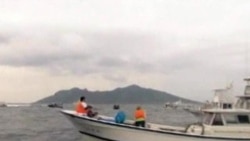WASHINGTON —
China continues to accuse Japan of provoking disputes over contested islands in the East China Sea. The Obama administration opposes any unilateral change to Japanese administration of the islands.
China says Japanese activists near the disputed islands are worsening tensions between Beijing and Tokyo.
"It's Japan that stirred up and exacerbated tensions on the islands issue. It's also Japan that took direct and threatening actions. These are very evident facts that say who is right or wrong," said Chinese Ambassador to the United States Cui Tiankai.
The potentially mineral-rich islands, known as "Diaoyu" in China and "Senkaku" in Japan, are administered by Tokyo - a status quo that Washington backs.
U.S. Defense Secretary Chuck Hagel said any change that raises tensions could threaten regional stability. "Therefore, the United States opposes any unilateral or coercive action that seeks to undermine Japan's administrative control," he said.
And Beijing sees that as Washington siding with Tokyo, said Cato Institute analyst Justin Logan.
"The American position, I think, has been confusing and unhelpful. We say that we don't take a position on whether the islands are Japanese, but we take a position that they are covered by a treaty with Japan," said Logan.
A U.S.-Japan defense treaty covers any attack on Japanese-administered territory. Chinese ambassador Cui said Japan and its allies risk "long-term damage" over the islands.
"Some Japanese politicians take up these actions like lifting a rock, only to drop it on their own feet. We hope that other parties do not lift up rocks for the Japanese, and we hope even more that these rocks don't end up falling on their own feet," said Cui.
Washington wants better relations with Beijing, but the chairman of the U.S. Joint Chiefs of Staff, General Martin Dempsey, said he has told Chinese officials that does not mean weakening ties with Japan.
"Would we trade off our relationship with Japan in order to have a stronger relationship with China? The answer is 'No,'" said Dempsey.
Japan is protesting a Chinese warship locking weapons-fire-control radar on one of its patrols near the islands. U.S.-Chinese relations are a constant source of anxiety in Japan, said American Enterprise Institute analyst Michael Auslin.
"They don't want a China and the United States that are at loggerheads because that's bad for Japan. On the other hand, they don't want a China and the United States that suddenly become 'best friends forever' and that would leave Japan as the odd-man-out of that arrangement," said Auslin.
Chinese officials also are unhappy about June military drills between Japan and the United States that will involve recapturing an isolated island. U.S. officials say the scenario is not aimed at any specific country.
China says Japanese activists near the disputed islands are worsening tensions between Beijing and Tokyo.
"It's Japan that stirred up and exacerbated tensions on the islands issue. It's also Japan that took direct and threatening actions. These are very evident facts that say who is right or wrong," said Chinese Ambassador to the United States Cui Tiankai.
The potentially mineral-rich islands, known as "Diaoyu" in China and "Senkaku" in Japan, are administered by Tokyo - a status quo that Washington backs.
U.S. Defense Secretary Chuck Hagel said any change that raises tensions could threaten regional stability. "Therefore, the United States opposes any unilateral or coercive action that seeks to undermine Japan's administrative control," he said.
And Beijing sees that as Washington siding with Tokyo, said Cato Institute analyst Justin Logan.
"The American position, I think, has been confusing and unhelpful. We say that we don't take a position on whether the islands are Japanese, but we take a position that they are covered by a treaty with Japan," said Logan.
A U.S.-Japan defense treaty covers any attack on Japanese-administered territory. Chinese ambassador Cui said Japan and its allies risk "long-term damage" over the islands.
"Some Japanese politicians take up these actions like lifting a rock, only to drop it on their own feet. We hope that other parties do not lift up rocks for the Japanese, and we hope even more that these rocks don't end up falling on their own feet," said Cui.
Washington wants better relations with Beijing, but the chairman of the U.S. Joint Chiefs of Staff, General Martin Dempsey, said he has told Chinese officials that does not mean weakening ties with Japan.
"Would we trade off our relationship with Japan in order to have a stronger relationship with China? The answer is 'No,'" said Dempsey.
Japan is protesting a Chinese warship locking weapons-fire-control radar on one of its patrols near the islands. U.S.-Chinese relations are a constant source of anxiety in Japan, said American Enterprise Institute analyst Michael Auslin.
"They don't want a China and the United States that are at loggerheads because that's bad for Japan. On the other hand, they don't want a China and the United States that suddenly become 'best friends forever' and that would leave Japan as the odd-man-out of that arrangement," said Auslin.
Chinese officials also are unhappy about June military drills between Japan and the United States that will involve recapturing an isolated island. U.S. officials say the scenario is not aimed at any specific country.





